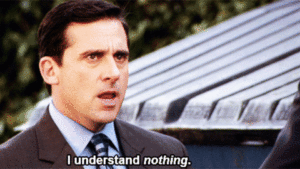Through the very persistent prodding of my dad, I self-published a book of creative writing and illustrations during my first year in high school. I compiled about 5 years of personal and class work along with self-made drawings and photographs. Since the first finished product, my dad prompted me to start the next one. The sparse collection of works for the next manuscript continues to live on my laptop. It’s a hodgepodge of high school creative writing assignments, intimate reflections polished for public eyes, and formal attempts and technique practice. Although I have unfortunately neglected my creative projects, I am always writing (how many times can I mention thesis in this post?). I will always be expected to write well throughout career and life.

The real goal is to look this cuddly when writing…
To me, writing remains one of the most valuable, transferable skills. In this semester alone, I have probably already written over 30 pages of material, and thesis isn’t even done yet (double majoring isn’t really that bad until thesis happens…)! More and more I realize that academic and creative writing share a similar, general purpose: to communicate. During the summer of 2014, as part of my summer research program at the University of Chicago, I participated in a course on “Academic and Professional Writing.” It sounds dry and daunting, but believe me, never have I been more informed of the tiniest of adjustments that can make a huge adjustment in writing (the professor was a former lawyer, so she definitely knew a thing or two about manipulating rhetoric).
- Avoid nominalizations
The word nominalization itself is a nominalization, turning a verb, adjective, or adverb into a noun. You know what I’m talking about, those words ending in “-tion” that seem to sputter out at 2 AM on the keyboard, making it that bit closer to the final page requirement. Take this example:
- The lack of editing of the committee’s statements was a failure of responsibility and resulted in ineffective communication.
Revise nominalizations:
- Lacking editing, the committee’s statements were responsible for ineffective communication.
Wow are those even the same sentence?! The second sentence clearly designates a subject. There is something accountable, the committee’s statements, for the ineffective communication. Yes, there are still nominalizations (i.e. lacking editing), but this gerund form actually serves as an adjective (wow, grammar nerd alert)! Nominalizations might be lurking everywhere on your resume or personal statements. In writing that has tight format restrictions or limited word count, revise and remove nominalizations! Those suckers take up too much space from what you actually want to say!
2. Who is the doer of the action?
Like I mentioned above, writing is much more powerful if there is something or someone accountable for the actions of a sentence. This tip is tricky when it comes to academic writing. We avoid personal pronouns. Even in academic writing, the doer of the action can be clear (fun fact, the following sentence is from my thesis):
- The formality of classical music culture focuses heavily on a live performance as an assessment of skill and level which effects levels of MPA.
There are two verbs here, focuses and effects. How can these two “actions” be streamlined?
- Classical music culture focuses on live performances as skill and talent assessments, effecting musicians level of performance anxiety.
Now, it is clear that classical music culture is what focuses on live performance and performance anxiety. “The formality” served as another nominalization.
3. Get it all out, and then revise, revise, revise…
… and have multiple people look over it if you can. It is important to get the “bad first draft” out of the way and then to revise from there. If possible, have as many pairs of eyes look over your work. They are bound to catch something you haven’t and if they don’t understand what you’re saying, there’s a chance not many other people will either.
4. KNOW YOUR AUDIENCE!
If you take anything away form this blog post, other than I need to edit my thesis still, take away this tip. When writing, always know your audience. I have heard this from so many of my mentors and professors in all types of fields. For instance, in a cover letter, an employer will know their company’s history, so you shouldn’t go into a long history about the place. But has this company shaped your opinion on a topic you learned in a class and you want to write about it for a final paper? That’s where the history should go, and how it has informed your understanding and opinion.
When you’re writing, a paper, a cover letter, an official statement, what is your process? How do you shape your personal voice while still maintaining content integrity? Whatever it is, I hope it comes with a constant vigilance for fixing typos and communicating the message to your reader!







